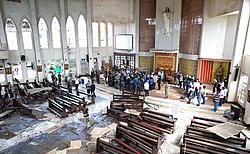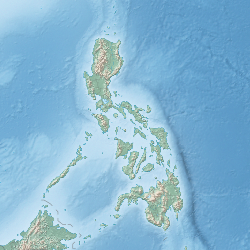WestMinCom stated that the second IED was placed inside the utility box of a motorcycle parked outside the cathedral. [19] Wounded individuals were immediately brought to the Integrated Provincial Health Office and Sulu Sanitarium for medical treatment. [20]
Perpetrators and suspects' identities
The Islamic State (IS) took responsibility for the bombings, which they said were committed by "two knights of martyrdom" against a "crusader temple". [21] Philippine military and peace advocates blamed the ASG's Ajang-Ajang faction, citing evidence from military intelligence operatives stating that they had intercepted ASG plans to bomb other parts of downtown Jolo months before. [7] [9] [22] Kamah, a brother of a slain ASG leader, has been tagged as the prime suspect in the bombings. [23] A sub-leader of the ASG named Hatib Hajan Sawadjaan has been named another prime suspect in connection with the bombings plot as their faction too has connections to IS. [24]
On February 1, Philippine Interior Secretary Eduardo Año stated that two Indonesian suicide bombers were involved in the attacks, and were aided by local Abu Sayyaf who acted as guides. [25] The bombers were mistaken for Malaysians; one of them, identified by nom de guerre as Abu Huda, [26] [27] had been living in Sulu province for some time. [25] The second bomber was alleged to be Abu Huda's wife, who had arrived in the province a few days prior to the bombings. [25] The woman is believed to have been the first bomber inside the cathedral, while her husband carried out the second blast at the entrance. [28] PNP chief Oscar Albayalde explained that the Indonesian bombers sailed Southwest to Jolo from Lampinigan Island (Basilan Province) on January 24 and stayed there for a few days. However, it could not be ascertained whether the two went to the island straight from Indonesia or had been around Mindanao island far longer. [27]
On February 4, the main suspect Kamah together with his four accomplices finally surrendered to the authorities following heavy military operations. [27] [29] The four other accomplices were identified as: Albaji Kisae Gadjali (alias "Awag"), Rajan Bakil Gadjali (alias "Radjan"), Kaisar Bakil Gadjali (alias "Isal") and Salit Alih (alias "Papong"). [30] [31] The PNP have filed murder charges on 5 of the suspects and 14 other suspects who remain at large (as of November 2019). [32]
The Philippine Interior Secretary. [33] considers the suspect identification process as complete with the arrest of the five suspects and three others including the two dead bombers, although several others remain at large. The prime suspect Kamah denies all charges and any involvement in the bombings. The prosecution holds that eyewitness accounts form an adequate basis for indictment for Kamah and the other defendants. [33]
In July 2019, the Indonesian National Police (POLRI) confirmed Indonesian citizens involvement in the bombing. [34] POLRI announced the couple identified as Rullie Rian Zeke (RRZ) and Ulfah Handayani Saleh (UHS) from Makassar, South Sulawesi. The announcement came after the POLRI arrested and interrogated two suspected militants affiliated to Jamaah Ansharut Daulah (JAD)- a group in Indonesia with links to ISIL- who confirmed the deceased couple RRZ and UHS were also JAD members. [4] [5] In May 2019, intelligence by Malaysian Special Branch uncovered RRZ and UHS were earlier helped by two Indonesian militants with links to ISIL working as labourers in Keningau District of Sabah in Malaysia with intentions to travel to the southern Philippines via confession of two suspects arrested by Royal Malaysian Police early in May. [6] A subsequent POLRI arrest and thorough investigation of another group of Indonesian militants in Padang of West Sumatra in June 2019, confirmed the identity of RRZ and UHS. [5]
Through deoxyribonucleic acid (DNA) test by Indonesian police, the deceased couple family were able to be traced as both being Indonesian deportees from Turkey serving under the direction of an East Kalimantan JAD member named Yoga residing in Malaysia and recently arrested by the Royal Malaysian Police in Sabah. [35] Yoga are the current connectors of Islamist terrorists organization between Indonesia, Malaysia and the Philippines replacing Andi Basso who is being actively hunted for his involvement in the 2016 Samarinda church bombing in East Kalimantan. Andi Basso is believed by Indonesian authorities to be currently hiding in the Southern Philippines. [35]






